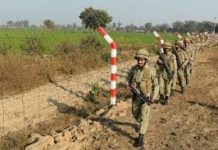Web Desk
Pakistan has temporarily suspended incoming pedestrian movement at overland border crossings with Afghanistan and Iran to “restrain import of any new mutation” of the coronavirus.
The ban will take effect Tuesday night and remain in place until May 20, said the National Command and Operation Center (NCOC) on Sunday.
“The current policy of Land Border Management with Afghanistan and Iran has been reviewed to ensure regulated inbound pedestrian movement and effective management of COVID protocols at Border Terminals(BTS),” read the statement issued by National Command and Operation Centre (NCOC).
According to the NCOC , border terminals (BTs) will remain open for seven days a week. “Employment strength of LEAs/health staff at BTs will be increased for implementation of testing protocols and to control high traffic density,” read the statement.
The coronavirus monitoring body said inbound pedestrian movement would cease with effect from midnight May 4-5 with the exception of Pakistani nationals in Afghanistan and Iran who desire to return to their country and in extreme medical emergency cases etc.
It also said that all outbound pedestrian movement is permissible.
Highlighting the testing and quarantining protocols, NCOC said inbound pedestrians will undergo Rapid Antigen Test(RAT). Positive cases (for Pakistani nationals only) will be shifted to nearby quarantine facilities.
“Inbound pedestrian with Afghan exemptions will also undergo RAT testing at BTs. Positive cases, if any, will be reverted back to Afghanistan,” read the NCOC statement.
It also said that thermal scanning for all drivers and co-drivers will be carried out on arrival at the BTs. Symptomatic cases will undergo RAT testing, positive cases will be dealt with as per the procedure spelled above.
Pakistani nationals in Afghanistan and Iran, as well as Afghans seeking extreme emergency medical treatment in Pakistan will, however, be allowed to enter the country. All outbound pedestrian movement will be permissible, the statement said.
The tightened border controls come a day after officials in the southern Pakistani province of Sindh said they had detected the South African and Brazilian coronavirus variants in “some samples.” The highly contagious variants have raised fears of escalations in new infections.
A British variant, however, officially remains the primary source of the current surge in infections across Pakistan.















